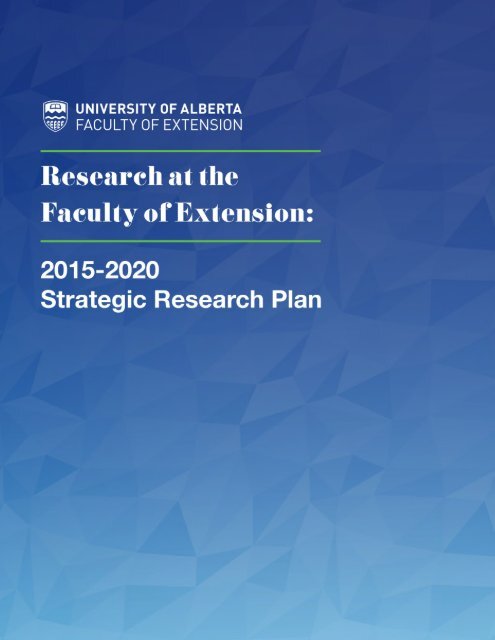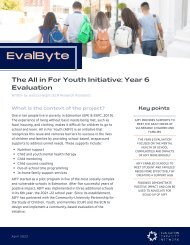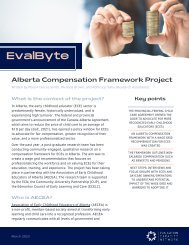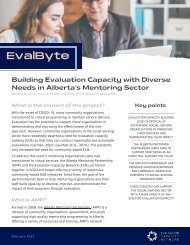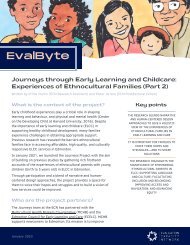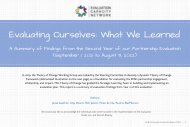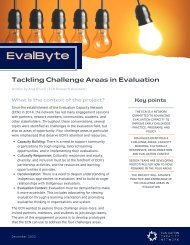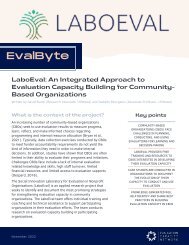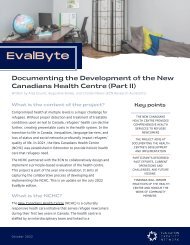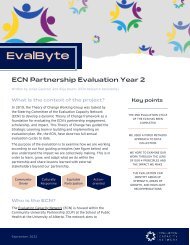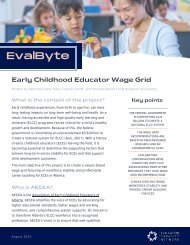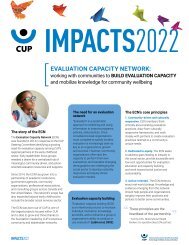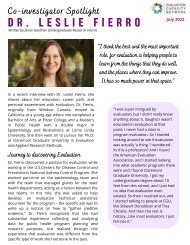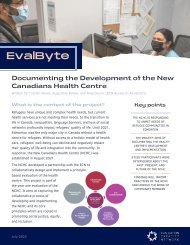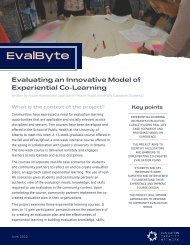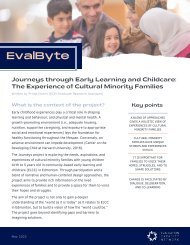Strategic Research Plan 2015-2020
You also want an ePaper? Increase the reach of your titles
YUMPU automatically turns print PDFs into web optimized ePapers that Google loves.
[Cover page] Logo | <strong>Research</strong> at the Faculty of Extension: <strong>2015</strong>-<strong>2020</strong> <strong>Strategic</strong><br />
<strong>Research</strong> <strong>Plan</strong> (Watermark: Draft)<br />
1
2<br />
Executive Summary<br />
With over 100 years of rich history, the Faculty of Extension at the University of Alberta is driven by a<br />
commitment to fulfill our mandate of “uplifting of the whole people to inspire the human spirit for the<br />
public good” by promoting “community engagement, near and far.” The distinguishable characteristic of<br />
research at the Faculty of Extension is our expertise in the study and practice of engagement, which<br />
transcends disciplinary and sectoral boundaries ⎯ in particular, our expertise in rigorous theorization of<br />
effective engagement practices. Succinctly, our distinction is that we are “engagement scholars” that<br />
practice through an interdisciplinary and community lens!<br />
As a faculty of interdisciplinary scholars, our strengths encompass scholarship and practice of<br />
engagement, capacity-building, knowledge mobilization, social justice, and community development, as<br />
well as communication and technology, planning and sustainable development, and language and<br />
globalization, to name a few. We collaborate with a broad range of community and academic partners to<br />
engage, inform, and enrich our research and scholarship activities. For example, the Faculty of Extension<br />
supports lasting partnerships and community research collaborations through our unique and respected<br />
research centres. These centres operate as inclusive portals for fostering shared research, knowledge<br />
mobilization, and capacity building in our communities.<br />
Through a series of strategic planning retreats in <strong>2015</strong> and early 2016, we have identified our priorities<br />
and intentions for the next five years, laying the groundwork for a unified research strategy. This<br />
<strong>Strategic</strong> <strong>Research</strong> <strong>Plan</strong> represents a collective voice of faculty whose expertise, resources, and actions<br />
will make our vision a reality.<br />
Our <strong>Strategic</strong> <strong>Research</strong> <strong>Plan</strong> comprises a set of shared values, a central goal, objectives, actions, and<br />
desired impacts. First, our VALUES reflect the innovative, interdisciplinary, and community-engaged<br />
character of research in the Faculty of Extension at the University of Alberta:<br />
• Responsive to community needs<br />
• Boundary spanning<br />
• Social justice and reconciliation<br />
• Capacity building<br />
• Diverse forms of knowledge<br />
• Integration of discovery/research, learning/teaching, and citizenship/service<br />
Our GOAL is to advance engagement scholarship in collaborative ways, in order to achieve our mission<br />
and actualize our vision. This builds on the vision and mission defined in the Faculty of Extension’s most<br />
recent Academic <strong>Plan</strong> (2009-2014): “VISION: To be an exemplary centre for the scholarship and practice<br />
of community-university engagement. MISSION: To provide leadership for social and individual<br />
betterment through community-university collaborations in learning, discovery, and citizenship.”<br />
Importantly, in the University of Alberta’s Institutional <strong>Strategic</strong> <strong>Plan</strong>: For the Public Good, “Engage” is<br />
identified as one of the five succinct actions, while engagement is central to one of the five institutional<br />
goals.<br />
We have identified four key OBJECTIVES to inform our strategic priorities. All of these objectives<br />
integrate community-university engagement through discovery (research), learning (teaching), and<br />
citizenship (service):<br />
• Build strategic relationships and engagement<br />
• Create spaces for innovation in engagement scholarship<br />
• Strengthen capacity through engagement scholarship<br />
• Mobilize knowledge about engagement scholarship
3<br />
Figure 1 presents specific actions to achieve these objectives. Furthermore, we have identified five major<br />
areas of IMPACTS that we seek to demonstrate through our engagement scholarship efforts:<br />
• Be recognized as a leader/catalyst in engagement scholarship<br />
• Produce and share research-informed knowledge<br />
• Influence policy and practice<br />
• Build capacities in and through engagement scholarship<br />
• Enhance our relationships/partnerships<br />
As we implement our <strong>Strategic</strong> <strong>Research</strong> <strong>Plan</strong>, we will work with the Faculty of Extension’s <strong>Research</strong><br />
Support Services (RSS) unit to monitor and evaluate research and practice impacts. Specifically, RSS will<br />
track the implementation of action items, and identify specific measures for each of the five impact areas<br />
and report on progress over time. Through this process, we will collect and document evidence, including<br />
impact stories and other qualitative and quantitative measures of impacts over time.
4<br />
Introduction and Context<br />
There is a growing shift in the academic paradigm, as we move away from the image of the university as<br />
the “ivory tower” and towards building more accessible and open spaces for learning, capacity-building,<br />
community development, and public good. This much needed transformation relies on developing strong<br />
community-university engagement. There is urgent pressure upon universities around the world to build<br />
and foster meaningful community engagement through mutually-beneficial and mutually-respectful<br />
partnerships. Indeed, by mobilizing different forms of knowledge (community, experiential, and<br />
academic) (Escrigas et al., 2014), and by aiming to solve complex societal problems (Fitzgerald et al.,<br />
2012), community-university engagement is a central component of effective higher education, research,<br />
and policy development.<br />
With over 100 years of rich history, the Faculty of Extension at the University of Alberta continues our<br />
commitment to contributing to social and individual betterment. We pursue opportunities to build<br />
community-university partnerships that integrate community-engaged learning (teaching), discovery<br />
(research), and citizenship (service). Our research is driven by a commitment to fulfill our mandate of<br />
“uplifting of the whole people for the public good” by promoting “community engagement, near and far.”<br />
The distinguishable characteristic of research at the Faculty of Extension is our expertise in the study and<br />
practice of engagement, which transcends disciplinary and sectoral boundaries ⎯ in particular, our<br />
expertise in rigorous theorization of effective engagement practices. Succinctly, our distinction is that we<br />
are “engagement scholars” that practice through an interdisciplinary and community lens!<br />
As a faculty of interdisciplinary scholars, our strengths encompass scholarship and practice of<br />
engagement, capacity-building, knowledge mobilization, social justice, and community development, as<br />
well as communication and technology, planning and sustainable development, and language and<br />
globalization, to name a few. We collaborate with a broad range of community and academic partners to<br />
engage, inform, and enrich our research and scholarship activities. The depth and breadth of our<br />
collective and collaborative experiences foster sustainable local, regional, national, and international<br />
relationships and partnerships across sectors. For example, the Faculty of Extension supports lasting<br />
partnerships and community research collaborations through our unique and respected research centres.<br />
These centres operate as inclusive portals for fostering shared research, knowledge mobilization, and<br />
capacity building in our communities. They are essential for building partnerships, for example, with<br />
municipal and provincial government organizations around shared areas of strategic importance.<br />
Increasingly, the active involvement of our researchers in centre initiatives presents innovative<br />
opportunities for more impactful engaged research and for the significant advancement of engagement<br />
scholarship.<br />
Through a series of strategic planning retreats in <strong>2015</strong> and early 2016, we have identified our priorities<br />
and intentions for the next five years, laying the groundwork for a unified research strategy. This<br />
<strong>Strategic</strong> <strong>Research</strong> <strong>Plan</strong> represents a collective voice of faculty whose expertise, resources, and actions<br />
will make our vision a reality.
5<br />
Elements of Our <strong>Strategic</strong> <strong>Research</strong> <strong>Plan</strong><br />
Our <strong>Strategic</strong> <strong>Research</strong> <strong>Plan</strong> comprises a set of shared values, a central goal, objectives, actions, and<br />
desired impacts. Our <strong>Strategic</strong> <strong>Research</strong> Framework (see page 9) visually represents each of these five<br />
elements, which are described in depth below:<br />
1. Values:<br />
Our values reflect the innovative, interdisciplinary, and community-engaged character of research in the<br />
Faculty of Extension at the University of Alberta.<br />
• Responsive to community needs<br />
Being responsive to community needs is a top priority for our research, guided by respectful engagement<br />
with our diverse community and university partners. In particular, we appreciate that community<br />
partners are the experts in defining current issues. We integrate their knowledge and insights to identify<br />
and address significant social and community issues (e.g., poverty), and generate effective researchinformed<br />
solutions to promote community betterment.<br />
• Boundary spanning<br />
Complex issues require innovative, often courageous, research partnerships and approaches. As<br />
boundary spanners, we draw on our interdisciplinary capacity to transcend boundaries and chart new<br />
territories. We contribute to innovative engagement scholarship by addressing the full spectrum of<br />
community engagement practices and purposes.<br />
• Social justice and reconciliation<br />
In addition to our ongoing commitment to mobilizing positive changes for all vulnerable populations, we<br />
are committed to respectfully addressing the Truth and Reconciliation Commission of Canada’s (TRC)<br />
recommendations through working with Aboriginal and non-Aboriginal partners and stakeholders.<br />
• Capacity building<br />
We strive to contribute to development of individual, community, and societal capacity to address<br />
contemporary issues. We seek to build mutually-respectful relationships and collaborative partnerships<br />
across sectors in order to enhance the capacities of both academic and non-academic partners in<br />
addressing their needs. Our work contributes to evidence-based approaches to improving policy and<br />
practice in all sectors.<br />
• Diverse forms of knowledge<br />
Our research honours the diverse forms of knowledge that emerge from the perspectives and<br />
experiences of community members, practitioners, Elders, and students, as well as academic researchers<br />
and teachers. We value the contributions of our broad network of scholars and the voices of socially<br />
marginalized population groups, including Aboriginal peoples and new Canadians, to name a few. We<br />
employ an interdisciplinary and cross-sectoral approach to our research processes.<br />
• Integration of research, teaching, and service<br />
In line with the University of Alberta’s commitment to discovery (research), learning (teaching), and<br />
citizenship (service), our research provides meaningful opportunities to advance integrated forms of<br />
scholarship, in which research, teaching, and service inform each other in reciprocal ways.
6<br />
2. Goal: Advancing engagement scholarship<br />
Our goal is to advance engagement scholarship in collaborative ways, in order to achieve our mission and<br />
actualize our vision. This builds on the vision and mission defined in the Faculty of Extension’s most<br />
recent Academic <strong>Plan</strong> (2009-2014): “VISION: To be an exemplary centre for the scholarship and practice<br />
of community-university engagement. MISSION: To provide leadership for social and individual<br />
betterment through community-university collaborations in learning, discovery, and citizenship.” 1<br />
Importantly, in the University of Alberta’s Institutional <strong>Strategic</strong> <strong>Plan</strong>: For the Public Good, “Engage” is<br />
identified as one of the five succinct actions, while engagement is central to one of the five institutional<br />
goals.<br />
Specifically, community-engaged research (CER) is one of the key approaches to achieving the goal of<br />
advancing engagement scholarship. CER emphasizes a shift away from an expert model of delivering<br />
university knowledge to the public, toward a more collaborative model, in which community partners<br />
play a significant role in creating and sharing knowledge to the mutual benefit of institutions and society<br />
(Boyer, 1996; Kellogg Commission, 1999).<br />
This overarching goal of advancing engagement scholarship serves as the anchor for each of the following<br />
Objectives, Actions, and Impacts.<br />
3. Objectives:<br />
We have identified four key objectives to inform our strategic priorities. All of these objectives integrate<br />
community-university engagement through discovery (research), learning (teaching), and citizenship<br />
(service).<br />
• Build strategic relationships and engagement (Objective A)<br />
We will build strategic relationships and maximize opportunities for meaningful engagement. To become<br />
one of the reputable “go to” institutions for engagement scholarship, we will continue to foster and<br />
expand our partnership networks, and raise the profile of the Faculty — by promoting our research and<br />
sharing the impacts of our work with community members, practitioners, policy-makers, fellow<br />
researchers, students, and other partners.<br />
• Create spaces for innovation in engagement scholarship (Objective B)<br />
We will create mutually respectful spaces for innovation and co-learning, in order to support research<br />
that incorporates interdisciplinary and cross-sectoral perspectives, and drives new ways of thinking about<br />
engagement scholarship and how it can be used to address complex social problems.<br />
• Strengthen capacity through engagement scholarship (Objective C)<br />
We will build academic and community capacities by engaging interdisciplinary researchers, students, and<br />
community partners in all stages of our research processes. This will strengthen our own work and foster<br />
the next generation of researchers and community leaders.<br />
• Mobilize knowledge about engagement scholarship (Objective D)<br />
As we address significant social issues and integrate diverse forms of knowledge, we will share our<br />
processes and findings to multiply long-term and sustainable impacts and inspire innovation across<br />
multiple sectors and disciplines. Through the systematic study of engagement, we will build knowledge<br />
about the practice of engagement.<br />
1<br />
Currently under review. The Faculty of Extension will put forward a faculty-wide <strong>Strategic</strong> <strong>Plan</strong> for <strong>2015</strong>-<strong>2020</strong>, integrating<br />
priorities outlined in this document, as well as those of other units.
7<br />
4. Actions<br />
We will undertake the following actions to achieve the Objectives A-D.<br />
• Under Objective A: Build strategic relationships and engagement<br />
o Build authentic, long-term partnerships that extend past project timelines<br />
o Undertake strategic conversations to prioritize partnership building at institutional (U of<br />
A), local, provincial, national, and international levels<br />
o Establish an open portal, which is publicly visible and accessible, by strategically inviting<br />
partners and researchers to engage<br />
o Be strategic and proactive in joining community initiatives and conversations<br />
o Commit to a national and international presence, through research efforts and<br />
communications<br />
o Task RSS (<strong>Research</strong> Support Services) in the Faculty of Extension to work collaboratively<br />
with our Marketing Department to seek strategic opportunities to incubate and promote<br />
research at Extension<br />
o Task RSS to develop a map/audit of relationships and networks to demonstrate scope of<br />
networks and encourage new partnerships through periodic updating<br />
• Under Objective B: Create spaces for innovation in engagement scholarship<br />
o Facilitate collaborative and reflective dialogues around significant social and community<br />
issues<br />
o Identify collective research themes that we can work together as a Faculty (e.g., poverty,<br />
TRC)<br />
o <strong>Strategic</strong>ally consolidate expertise and resources of various centres and research groups<br />
to execute Faculty-wide research initiatives<br />
o Continue to build our partnerships with municipal and provincial government<br />
organizations through shared research, knowledge mobilization, and capacity building in<br />
our communities<br />
o Strengthen partnerships by hosting a partnering practices symposium/workshop to be<br />
more proactive about partnership development<br />
o Explore opportunities to establish additional <strong>Research</strong> Chairs, such as Canada <strong>Research</strong><br />
Chair (CRC) in engagement scholarship within the Faculty<br />
• Under Objective C: Strengthen capacity through engagement scholarship<br />
o Launch MACE (Masters of Art in Community Engagement) program ⎯ recruit new<br />
students, offer high quality research practicum experiences, and supervise original theses<br />
o Advance the CBRE (Community-Based <strong>Research</strong> and Evaluation) Certificate program ⎯<br />
recruit new students, expand to/partner with other Faculties, and offer high quality<br />
research practicum experiences<br />
o Revise CBRE workshops ⎯ release new specialized offerings with a focus on new content<br />
in knowledge mobilization, policy, communication, and evaluation<br />
o Welcome and recruit community-based research fellows, visiting scholars, “skunk works”<br />
teams, or post-docs<br />
o Work with Community-Service Learning (CSL) for capstone and practicum projects<br />
o Explore opportunities to establish a PhD program in Community Engagement
• Under Objective D: Mobilize knowledge about engagement scholarship<br />
o Produce high quality research outputs, both traditional and non-traditional<br />
o Establish an innovative and creative Faculty research communication strategy, using multimedia<br />
podcasts, fast facts, stories, and tools<br />
o Task RSS to work collaboratively with our Marketing Department to seek strategic opportunities<br />
to mobilize research findings, and tell stories about the impacts of our research<br />
o Develop Faculty-wide publications, working with RSS and Marketing to plan, develop, publish,<br />
and disseminate<br />
o Develop a community engagement practice handbook/menu/portal/scrapbook on community<br />
engagement methods and examples to share across the University of Alberta and with other<br />
research partners<br />
o Develop “tools” for sectors to communicate research outcomes and promote widespread<br />
knowledge mobilization<br />
o Host biennial community research summit in the community ⎯ restructure existing biennial<br />
research showcase<br />
o Host annual high-profile Faculty lectures<br />
o <strong>Strategic</strong>ally nominate Extension scholars through the Dean’s office for distinguished research<br />
and teaching awards<br />
More specific details about our strategic action plan, including priority-setting and implementation timelines,<br />
will be determined collaboratively with the Associate Dean, <strong>Research</strong> (ADR), our <strong>Research</strong> Committee, and<br />
Professoriate members. In addition, RSS will contribute to the timely execution of those actions, and will<br />
monitor and evaluate implementation and impacts.<br />
5. Impacts:<br />
We have identified five major areas of impacts that we seek to demonstrate through our engagement<br />
scholarship efforts. As we implement our <strong>Strategic</strong> <strong>Research</strong> <strong>Plan</strong>, we will work with the <strong>Research</strong> Support<br />
Services (RSS) unit to monitor and evaluate research and practice impacts. Specifically, RSS will track the<br />
implementation of action items, and work with the ADR to identify specific measures for each of the five impact<br />
areas (see below) and report on progress over time. Through this process, we will collect and document<br />
evidence, including impact stories and other qualitative and quantitative measures of impacts over time.<br />
• Be recognized as a leader/catalyst in engagement scholarship<br />
Our Academic <strong>Plan</strong> identifies that our vision is to be “an exemplary centre for the scholarship and practice of<br />
community-university engagement.” By being recognized by community members, practitioners, policy-makers,<br />
fellow researchers, students, and other partners as a leader and catalyst in engagement scholarship, we can<br />
raise our institutional profile and successfully actualize this vision.<br />
• Produce and share research-informed knowledge<br />
We can increase the scope and depth of our impacts by sharing with other researchers and community leaders<br />
the lessons learned on research-informed knowledge, as it relates to community building, policy development,<br />
and social justice, to name a few. By strategically sharing our research findings, we can demonstrate how our<br />
work has contributed to academic literature, and map impacts of our work on public and community<br />
understandings of complex social issues.<br />
Ultimately, knowledge mobilization represents an important strategy for raising the Faculty of Extension’s<br />
profile, both internally to the University of Alberta campuses and externally to broader community domains<br />
including government, business, and non-profit sectors, as a reputable source for research and policy advisory<br />
support.<br />
8
• Influence policy and practice<br />
Influencing policy and practice is a key indicator of success for our engagement scholarship work. <strong>Research</strong>informed<br />
recommendations help shape policies that are relevant to the community and effective in the long<br />
term. Further, well-executed research can also inform community practice, and can lead to improved<br />
outcomes. This is why our research involves respectful collaboration with policy-makers and community<br />
practitioners throughout the research process.<br />
• Build capacities in and through engagement scholarship<br />
Through our engaged research, we seek to strengthen the capacities of community members, practitioners,<br />
policy-makers, students, and academic researchers in a broad range of skills, including collaboration,<br />
engagement, community-based action research, knowledge translation/mobilization, and improvement in<br />
research-informed policy-making and community practice. Showing evidence of how our engaged research has<br />
built capacities and empowered both internal and external researchers, external cross-sectoral communities,<br />
and interdisciplinary teams, is vital as a way of demonstrating tangible impacts of our work.<br />
• Enhance our relationships/partnerships<br />
Through our collaborative engaged research efforts, we are always building and strengthening relationships and<br />
partnerships with diverse team members and community stakeholders, representing interdisciplinary and crosssectoral<br />
interests. Typically, our research relationships and partnerships do not end at the conclusion of a<br />
specific research project. Rather, we are committed to continuing to enhance relationship-building efforts in a<br />
sustainable way, because witnessing sustainable impacts of engaged research takes time and community buy-in.<br />
We are genuinely dedicated to making a difference in our society by strategically using engaged research as a<br />
means for social change and transformation. We see the continued growth and enhancement of these<br />
relationships as an important indicator of our success as engagement scholars.<br />
9
Conclusion and Next Steps<br />
A series of inclusive, collaborative activities have guided the development of our <strong>2015</strong>-<strong>2020</strong> <strong>Strategic</strong> <strong>Research</strong><br />
<strong>Plan</strong> for the Faculty of Extension at the University of Alberta. Through our joint efforts at research retreats, we<br />
have placed a stronger and more strategic emphasis on the collective “we” of our research units. This has had a<br />
noticeable impact within our organizational culture, as we look beyond narrower individual priorities to forge a<br />
unified vision for our future. Our researchers and staff have shown passion and commitment to innovation in<br />
engagement scholarship, as well as excitement and aspiration for Faculty-wide collaborations and shared<br />
achievements. It is very important to sustain this momentum by continuing to build on and advance our<br />
collective expertise and resources in engagement scholarship, as we strive to actualize our vision of being an<br />
exemplary centre for the scholarship and practice of engagement. Although many other Faculties pursue<br />
community engaged research (CER), our distinguishable characteristic is that we are "engagement scholars”<br />
who conduct research about and practice engagement through an interdisciplinary and community lens.<br />
Through this scholarly engagement process, we contribute to rigorous and innovative theorization of<br />
engagement practices.<br />
This document identifies and describes the specific and related elements of our strategic research plan,<br />
including our core values and overarching goal, objectives, actions, and desired impacts (see our <strong>Strategic</strong><br />
<strong>Research</strong> Framework, page 9). However, it should be noted that this strategic plan is not fixed ⎯ rather, it is an<br />
evergreen document that responds to changing community and faculty needs and contexts. This ongoing<br />
process will involve collaborations among the Associate Dean, <strong>Research</strong> (ADR), <strong>Research</strong> Committee,<br />
Professoriate, <strong>Research</strong> Support Services (RSS), and other research staff within the Faculty of Extension. Where<br />
appropriate, we will also collaborate with other faculty units, such as Marketing and Continuing & Professional<br />
Education (CPE) programs, to enhance our efforts. For example, as noted above, the ADR will work with the<br />
<strong>Research</strong> Committee and Professoriate to articulate next steps for action planning and implementation. Followup<br />
research retreats will facilitate faculty-wide consultation, as may be needed to ensure that the <strong>Strategic</strong><br />
<strong>Research</strong> <strong>Plan</strong> aligns with the upcoming University of Alberta’s Institutional <strong>Strategic</strong> <strong>Plan</strong>. Further, RSS will be<br />
closely involved in helping implement key action items, as well as in periodically monitoring and documenting<br />
the effective execution of our <strong>Strategic</strong> <strong>Research</strong> <strong>Plan</strong> and its impacts.<br />
In the meantime, this collaboratively developed document provides a framework for the next five years of<br />
research priorities and activities in the Faculty of Extension at the University of Alberta. We are very grateful for<br />
our researchers and staff’s passion and commitment to this collective process, and we look forward to<br />
implementing this plan together!<br />
References:<br />
Boyer, E. L. (1996). The scholarship of engagement. Journal of Higher Education Outreach and Engagement,<br />
1(1), 11-20.<br />
Escrigas, C., Sanchez, J.G., Hall, & Tandon, R. (Eds.) (2014). Editors’ introduction. In Global University Network<br />
for Innovation (GUNi). Higher education in the world 5, Knowledge, engagement and higher education<br />
contributing to social change (pp. xxxi-xxxix). New York, NY: Palgrave Macmillan.<br />
Fitzgerald, H.E., Bruns, K., Sonka, S.T., Furco, A., & Swanson, L. (2012). The centrality of engagement in higher<br />
education. Journal of Higher Education Outreach and Engagement, 16(3), 7-27.<br />
Kellogg Commission on the Future of State and Land-Grant Universities (1999). Returning to our roots: The<br />
engaged institution. Washington, DC: National Association of State Universities and Land-Grant Colleges.<br />
10
11


